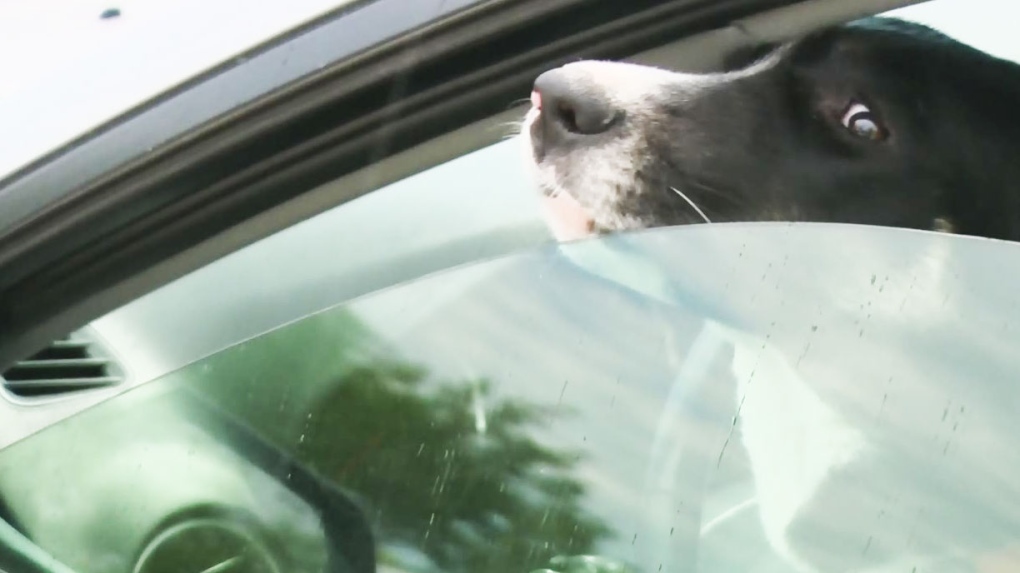Manitoba politician pushes for crackdown on people who leave pets in vehicles
 (File image)
(File image)
The Manitoba government may soon crack down on people who leave their pets in vehicles in extreme hot or cold weather.
A Progressive Conservative backbencher, Obby Khan, has introduced a private member's bill that would forbid people from leaving a pet unattended in a vehicle when the outside temperature is above 22 C or below -10 C.
There is an exception if the vehicle is left running and the climate control is on.
The proposal is similar to recent changes to Winnipeg's pet ownership bylaw, but it would extend the measure across the province.
Private member's bills are not often passed into law, but Khan's bill has received unanimous support from all parties so far and will go to public hearings before a final vote.
The bill was debated under rare circumstances, as several dog owners were allowed to bring their pets into the public gallery overlooking the legislature chamber.
"You can hear the dogs barking outside now," Khan told the chamber before the animals entered the gallery.
"They're excited about this bill."
Manitoba's Animal Care Act already requires animal owners to provide protection from "injurious heat or cold."
Khan's bill would provide specific temperature limits for pets left in vehicles. It would also allow a wider range of enforcement personnel, including conservation officers, to administer the law and break into a vehicle to save an animal if necessary.
"Outside of Winnipeg, there's only a handful of animal protection officers that are working through the (chief veterinary officer)," Khan said.
"With more officers being able to enforce this (and) faster response times, we keep in mind the safety and well-being of animals."
Pet owners who contravene the proposed law would be subject to fines that would be determined by a judge or justice of the peace.
The Winnipeg Humane Society, which fields hundreds of calls a year relating to animals left in hot or cold temperatures, welcomed the bill.
"This is a really big win for animals," Jessica Miller, the society's chief executive officer, said.
This report by The Canadian Press was first published Nov. 29, 2022.
CTVNews.ca Top Stories

Liberal MP says she's leaving politics over disrespectful dialogue, threats, misogyny
Liberal MP Pam Damoff says she won't run again in the next federal election, saying she has experienced misogyny, disrespectful dialogue in politics and threats to her life.
Concerns about Plexiglass prompt inspections at some Loblaws locations in Ottawa
Inspections are underway at more than one Loblaws location in Ottawa after complaints were filed about tall Plexiglass barriers.
Federal employees will be required to spend 3 days a week in the office
Starting in September, public servants in the core public administration will be required to work in the office a minimum of three days a week. The Treasury Board Secretariat says executives will need to be in the office four days per week.
OPP officer said 'someone's going to get hurt' before wrong-way Hwy. 401 crash
As multiple Durham police cruisers were chasing a robbery suspect on the wrong side of Highway 401 Monday night, an Ontario Provincial Police officer shared his concerns, telling a dispatcher, "Someone's going to get hurt."
Ont. woman who faked pregnancy to defraud doulas arrested again on similar charges
Victims of a Brantford, Ont., woman who was sentenced to house arrest earlier this year for defrauding and deceiving doulas say they’re not surprised she’s been apprehended again on similar charges.
Five human skeletons, missing hands and feet, found outside house of Nazi leader Hermann Göring
Archeologists have unearthed the skeletons of five people, missing their hands and feet, at a former Nazi military base in Poland.
Poilievre returns to House unrepentant for calling Trudeau 'wacko,' Speaker not resigning
An unrepentant Pierre Poilievre returned to the House of Commons on Wednesday to pepper the prime minister about his drug decriminalization policies after being booted the day prior for refusing to take back calling Justin Trudeau 'wacko' over his approach to the issue.
Construction begins on LGBTQ2S+ national monument in Ottawa
Shovels have hit the ground for constuction on Canada's LGBTQ2S+ national monument in Ottawa.
B.C. man awarded $5,000 in damages in first-of-it-kind intimate image case
In a first-of-its-kind case, a B.C. tribunal has ruled on a dispute involving the non-consensual sharing of intimate images, awarding damages and issuing orders that the photos be destroyed and taken offline.

































